Abstract
Antagonism by chlorpromazine of the responses of the rabbit aortic strip and the rat seminal vesicle to adrenaline and noradrenaline fulfils the conditions of competitive antagonism. Chlorpromazine was a remarkably potent antagonist (pA2 approximately 14) of adrenaline and noradrenaline. In the cat anaesthetized with chloralose small doses (1.8 to 4.5 mg/kg) of chlorpromazine greatly reduced or reversed the pressor effect of adrenaline but the pressor effect of noradrenaline was unaffected. A larger dose (9 mg/kg) of chlorpromazine slightly reduced the pressor effect of noradrenaline but caused a spectacular reversal of the pressor effect of adrenaline. This difference was not observed in rabbits and in cats treated with dichloroisoprenaline. Chlorpromazine potentiated the depressor effect of isoprenaline. On the basis of these findings it is concluded that in the cat chlorpromazine in small doses (1.8 to 4.5 mg/kg) has no real adrenergic blocking action and that the selective block of adrenaline pressor effects by these doses is due to a potentiation of adrenergic vasodilatation. Large doses (7.2 to 28.8 mg/kg) of chlorpromazine reduced the pressor effect of noradrenaline; reciprocal analysis showed that this inhibition is competitive.
Full text
PDF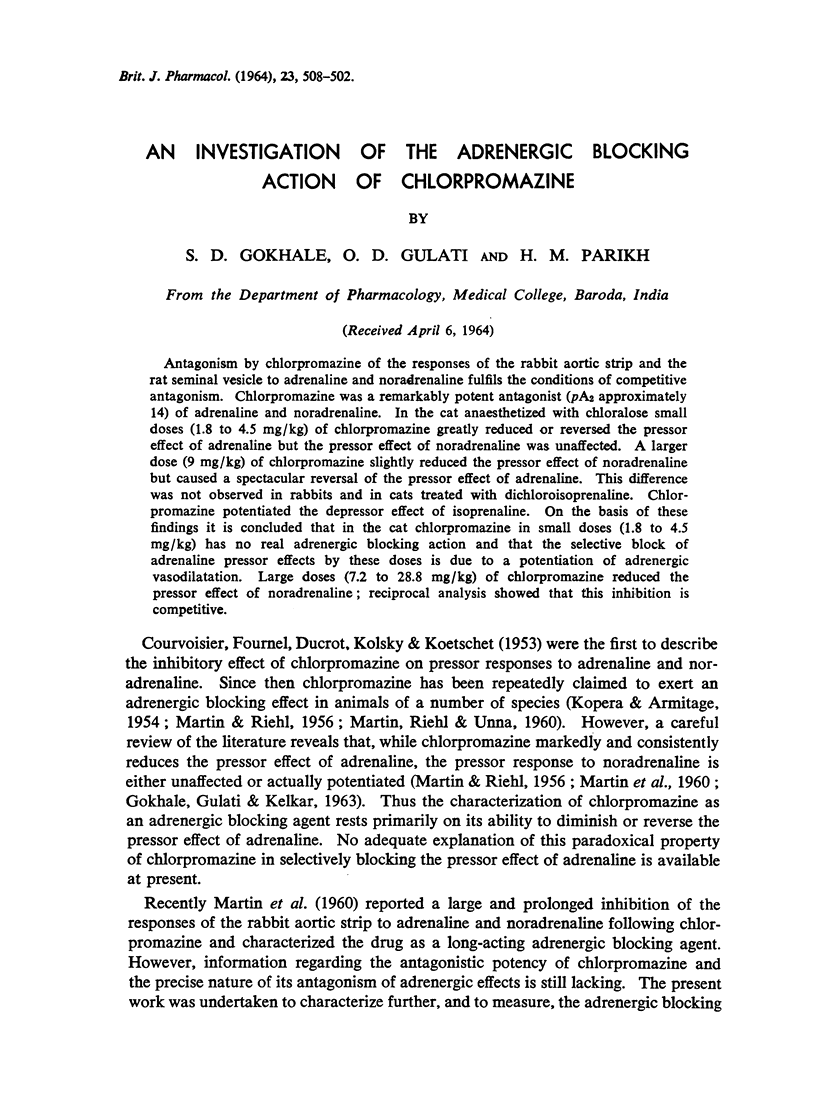
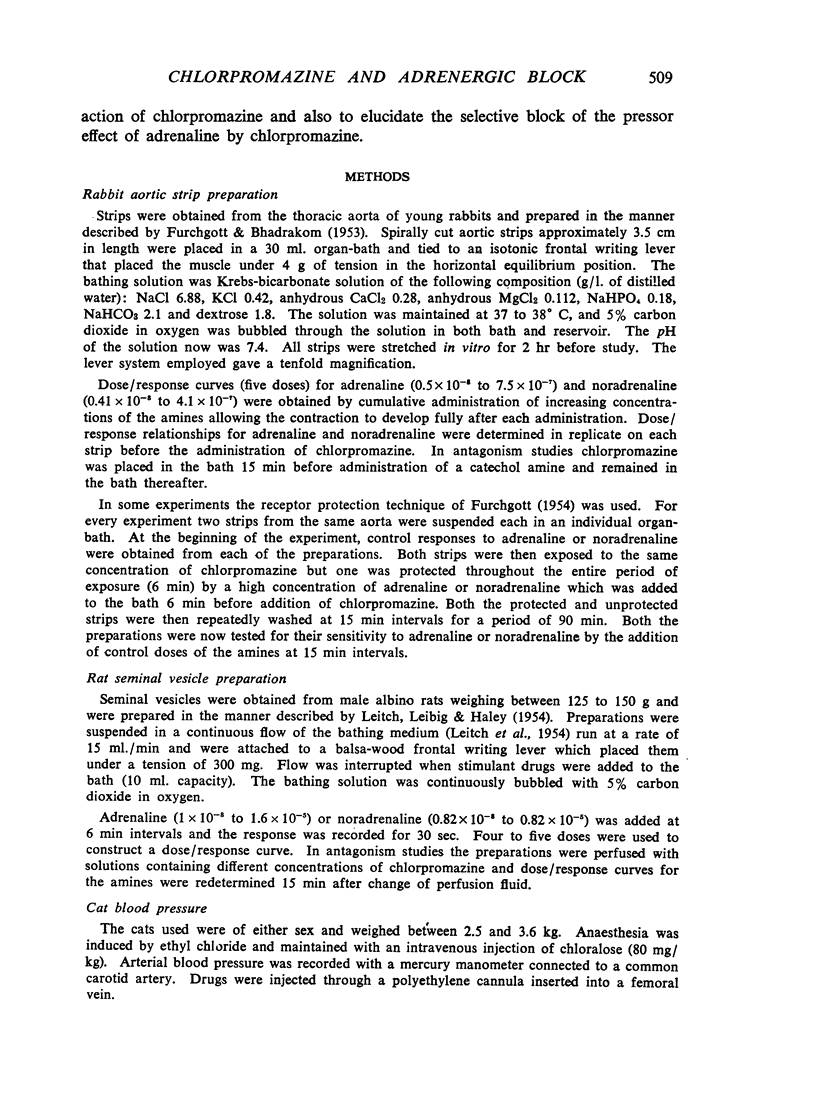
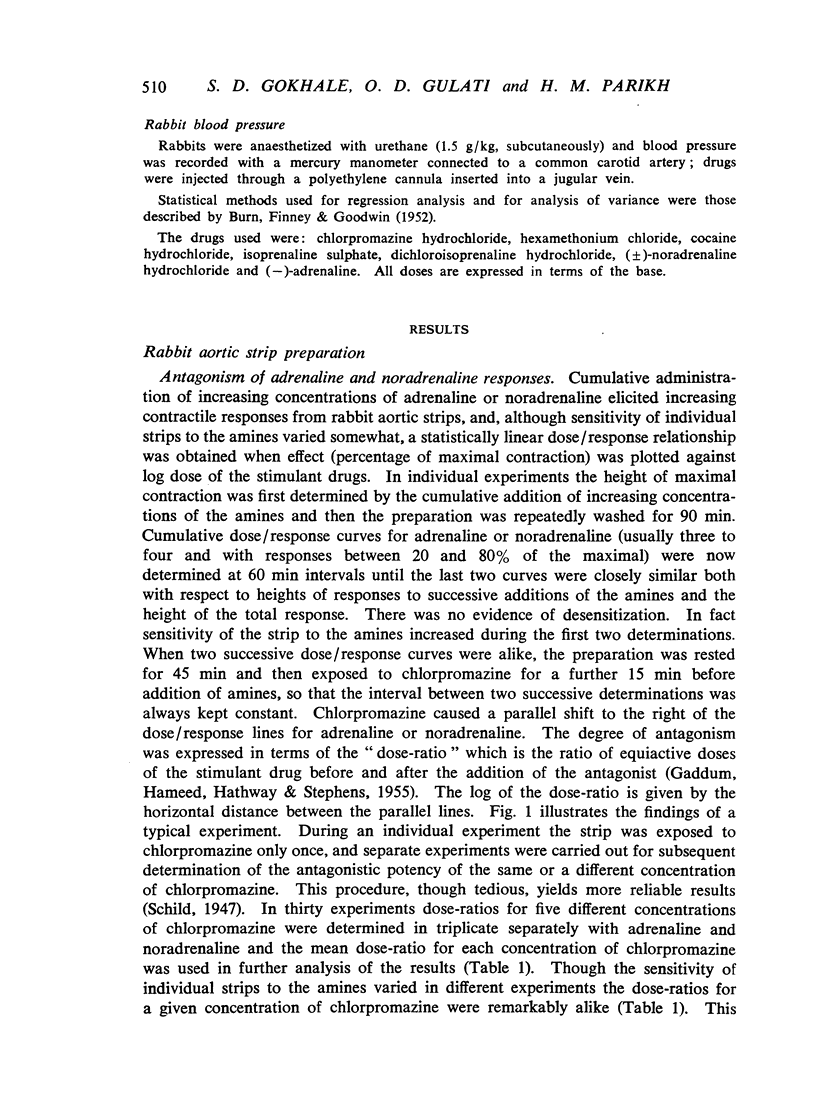
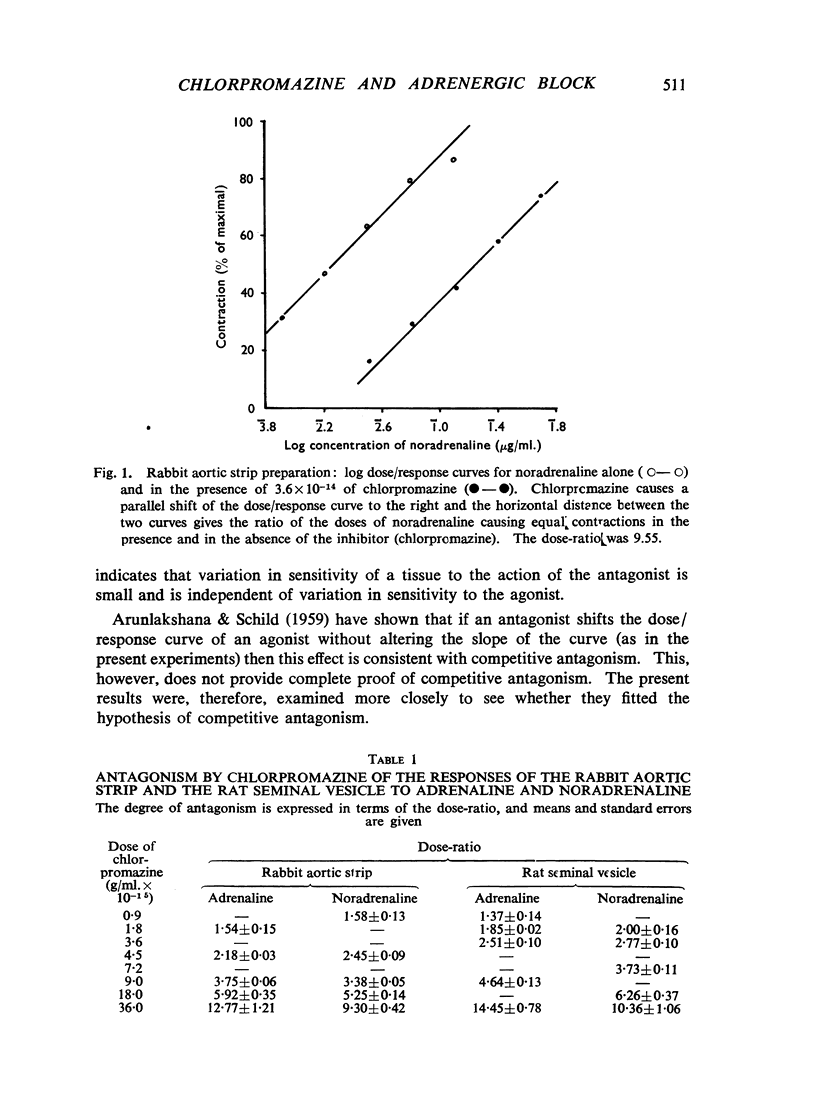
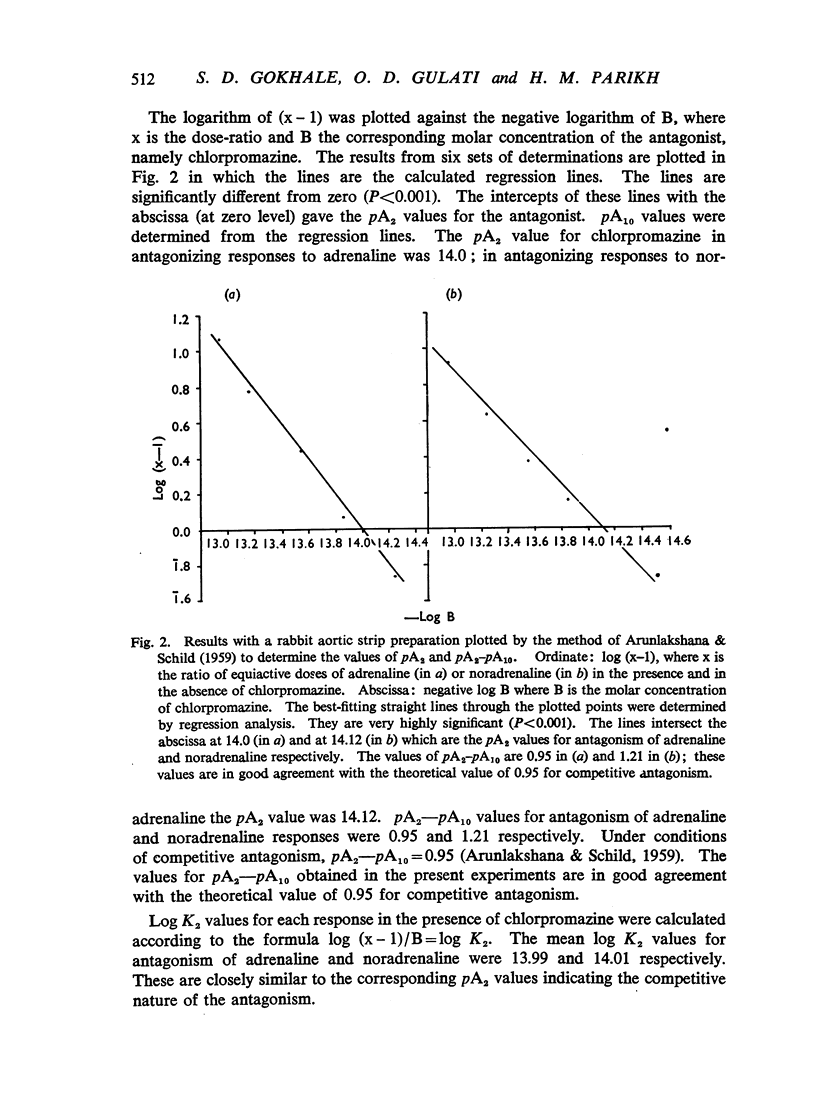
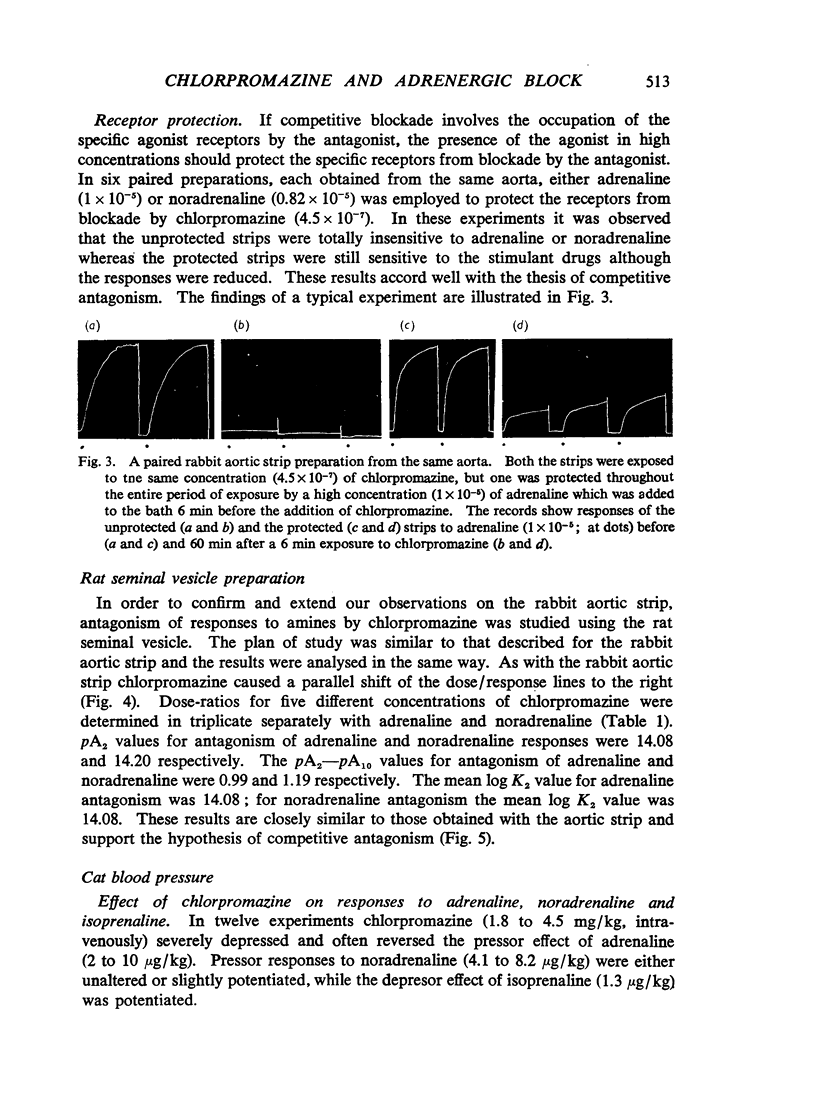
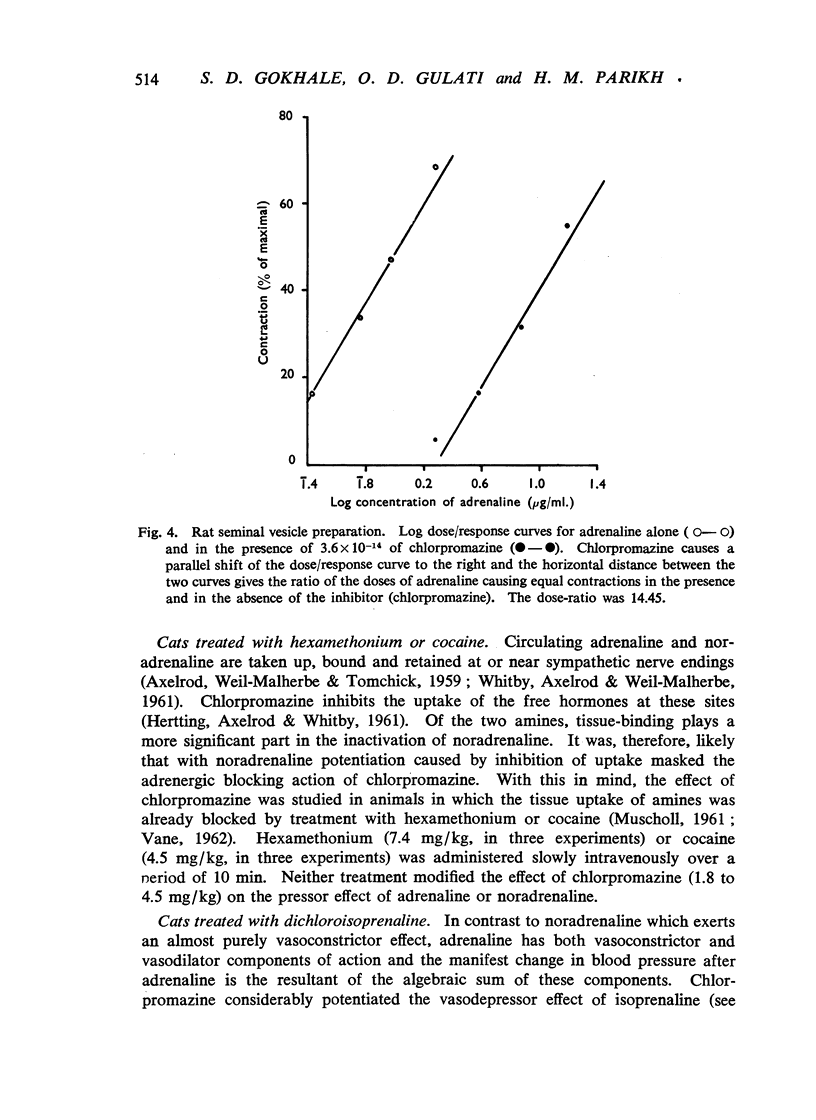
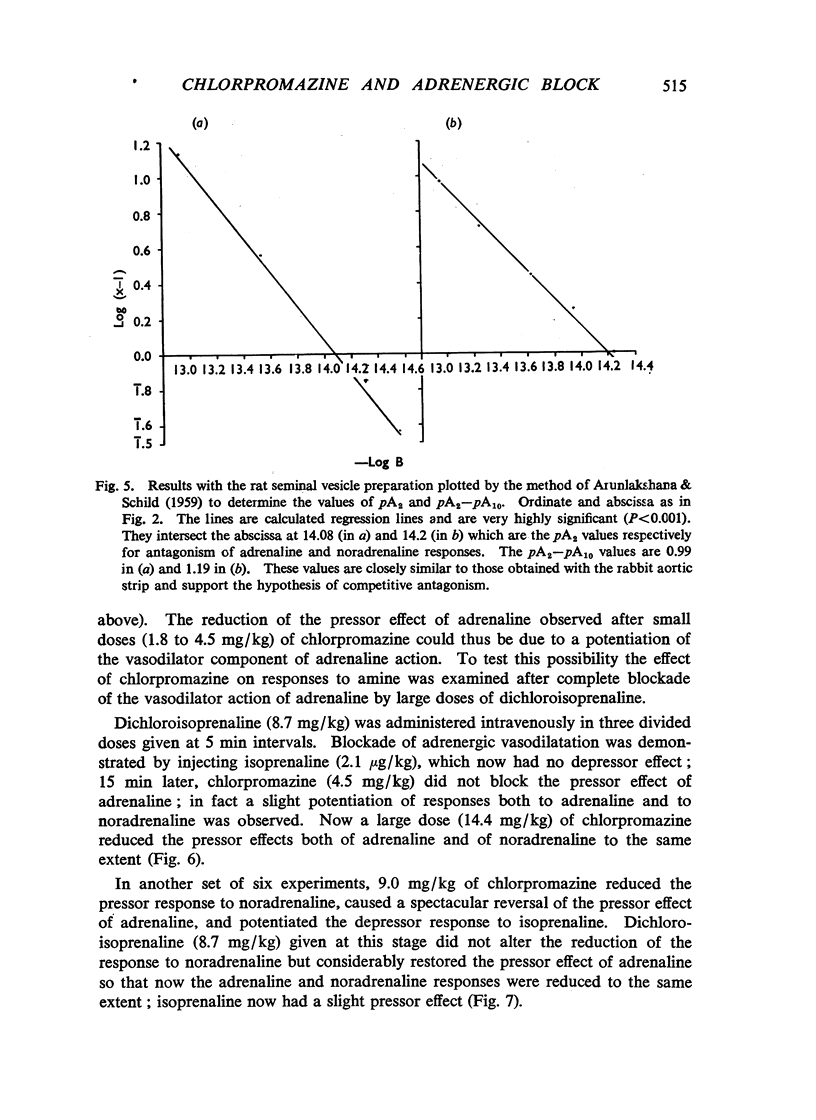
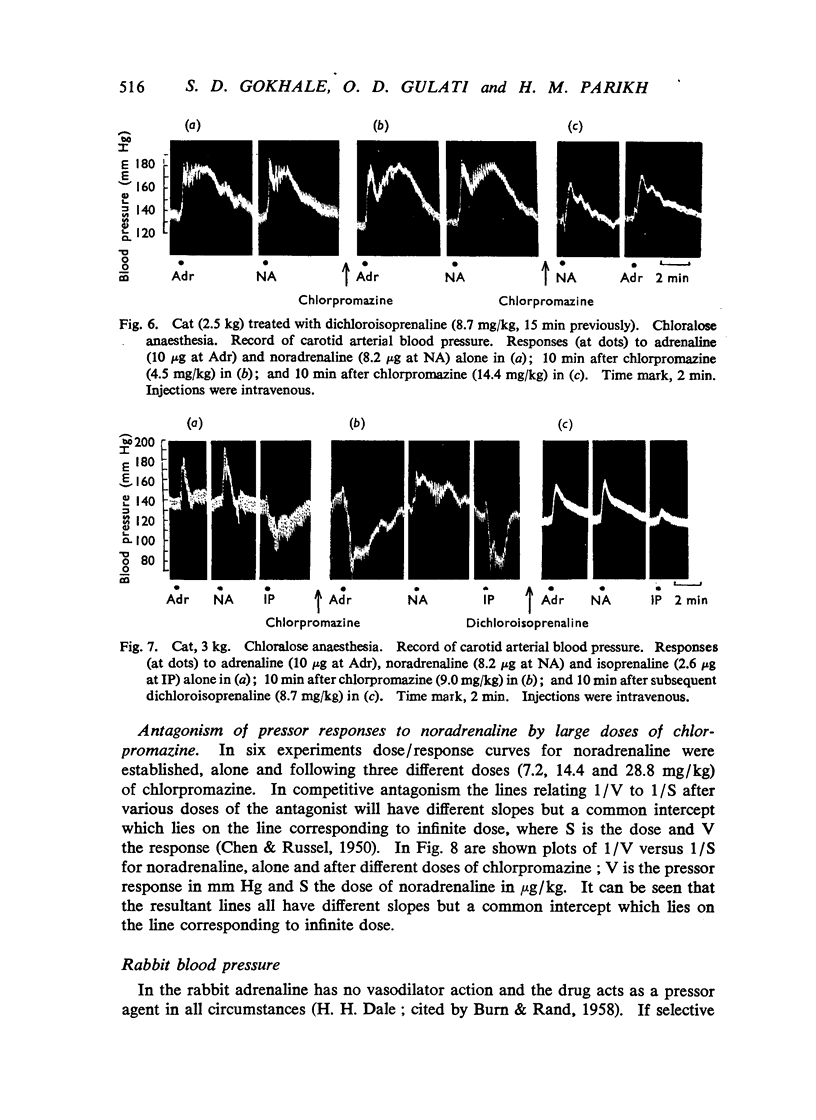
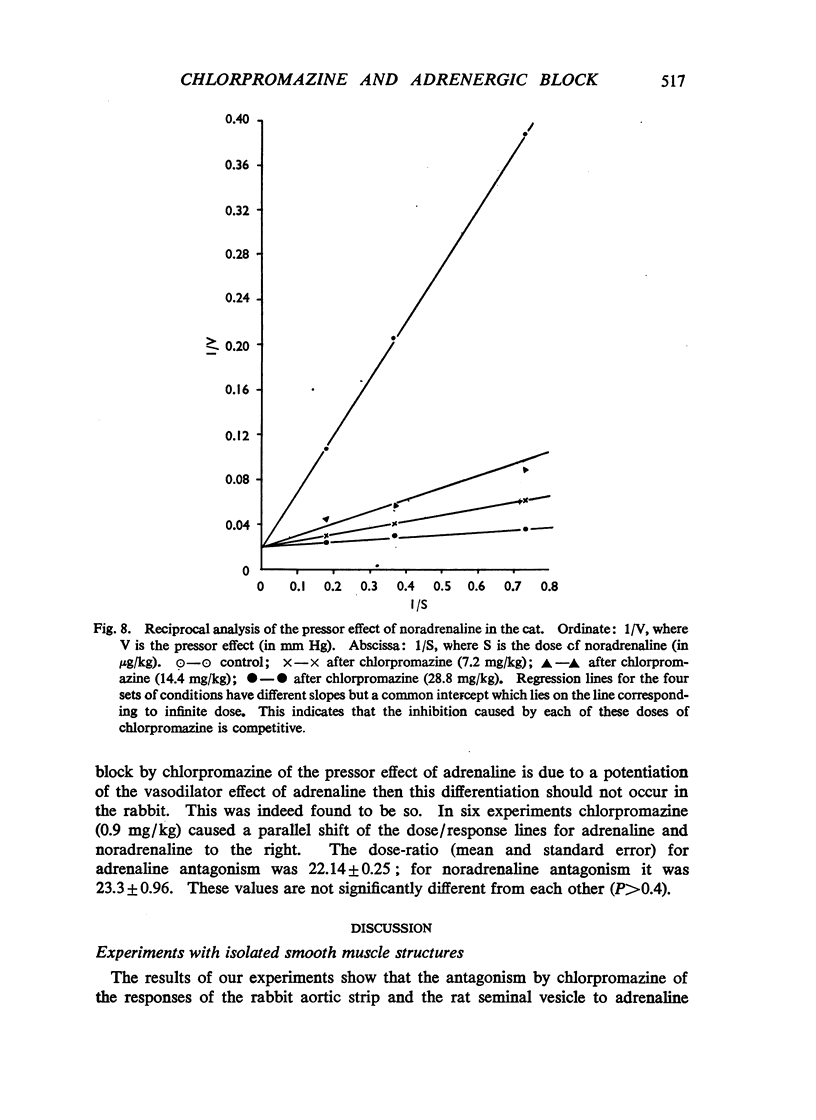
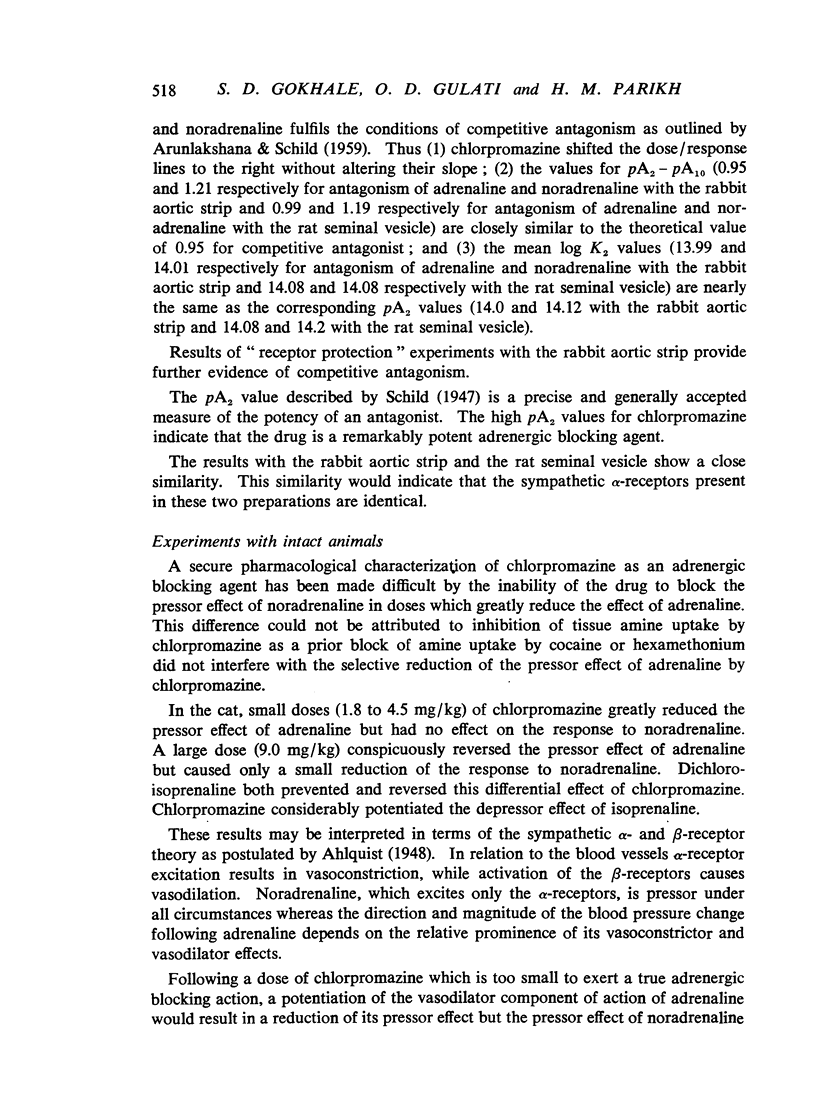
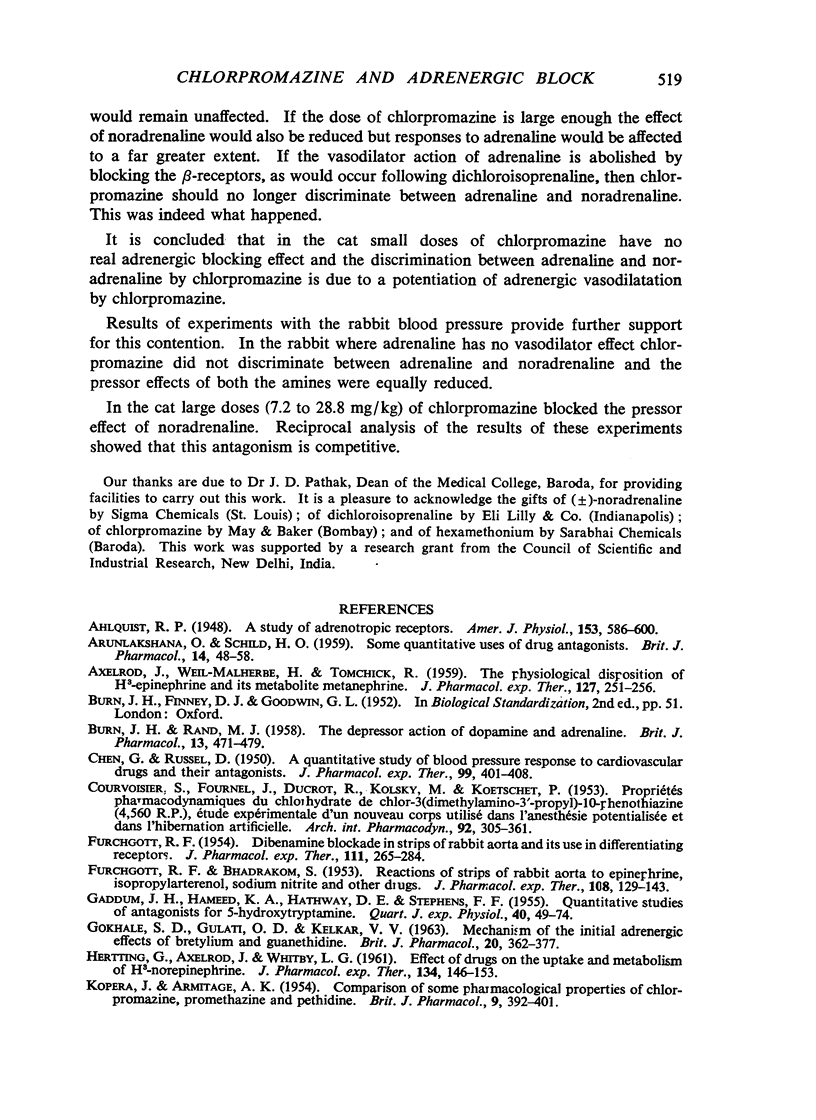
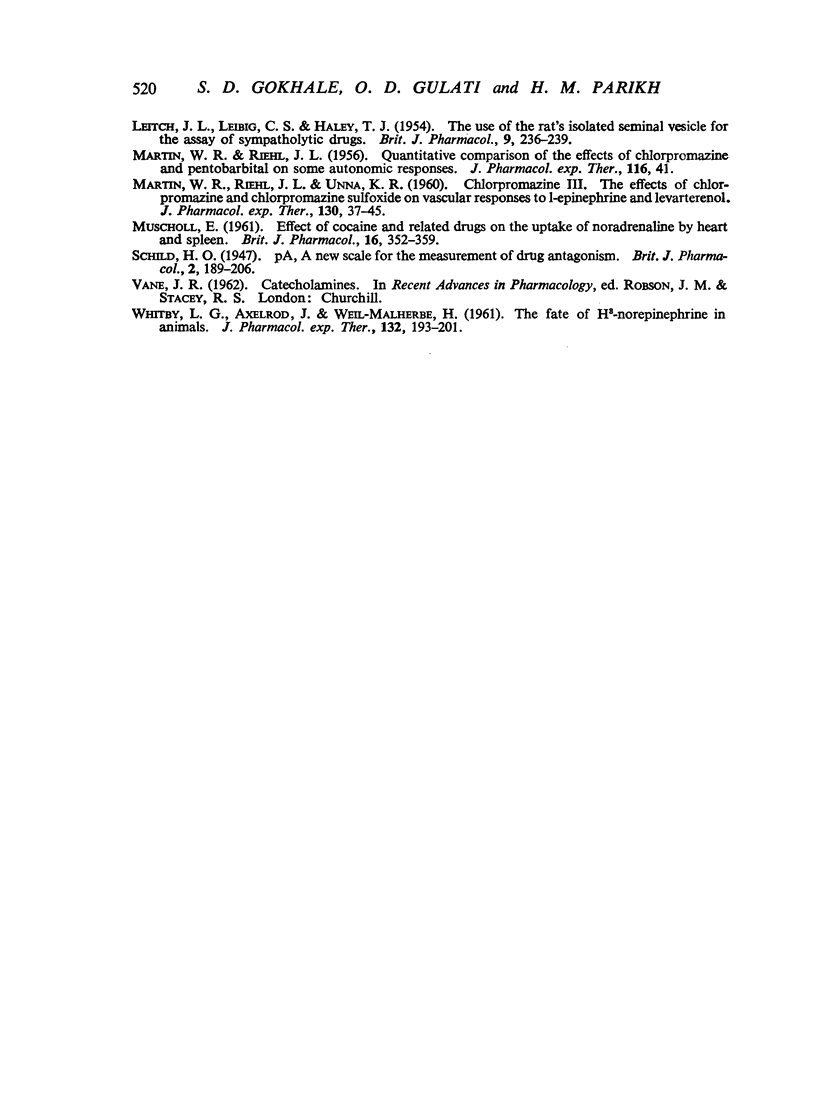
Selected References
These references are in PubMed. This may not be the complete list of references from this article.
- ARUNLAKSHANA O., SCHILD H. O. Some quantitative uses of drug antagonists. Br J Pharmacol Chemother. 1959 Mar;14(1):48–58. doi: 10.1111/j.1476-5381.1959.tb00928.x. [DOI] [PMC free article] [PubMed] [Google Scholar]
- AXELROD J., WEIL-MALHERBE H., TOMCHICK R. The physiological disposition of H3-epinephrine and its metabolite metanephrine. J Pharmacol Exp Ther. 1959 Dec;127:251–256. [PubMed] [Google Scholar]
- BURN J. H., RAND M. J. The depressor action of dopamine and adrenaline. Br J Pharmacol Chemother. 1958 Dec;13(4):471–479. doi: 10.1111/j.1476-5381.1958.tb00240.x. [DOI] [PMC free article] [PubMed] [Google Scholar]
- CHEN G., RUSSELL D. A quantitative study blood pressure response to cardiovascular drugs and their antagonists. J Pharmacol Exp Ther. 1950 Aug;99(41):401–408. [PubMed] [Google Scholar]
- COURVOISIER S., FOURNEL J., DUCROT R., KOLSKY M., KOETSCHET P. Propriétés pharmacodynamiques du chlorhydrate de chloro-3-(diméthylamino-3'-propyl)-10-phénothiazine (4,560 R.P.); étude expérimentale d'un nouveau corps utilisé dans l'anesthésie potentialisée et dans l'hibernation artificielle. Arch Int Pharmacodyn Ther. 1953 Jan;92(3-4):305–361. [PubMed] [Google Scholar]
- FURCHGOTT R. F., BHADRAKOM S. Reactions of strips of rabbit aorta to epinephrine, isopropylarterenol, sodium nitrite and other drugs. J Pharmacol Exp Ther. 1953 Jun;108(2):129–143. [PubMed] [Google Scholar]
- FURCHGOTT R. F. Dibenamine blockade in strips of rabbit aorta and its use in differentiating receptors. J Pharmacol Exp Ther. 1954 Jul;111(3):265–284. [PubMed] [Google Scholar]
- GADDUM J. H., HAMEED K. A., HATHWAY D. E., STEPHENS F. F. Quantitative studies of antagonists for 5-hydroxytryptamine. Q J Exp Physiol Cogn Med Sci. 1955 Jan;40(1):49–74. doi: 10.1113/expphysiol.1955.sp001097. [DOI] [PubMed] [Google Scholar]
- GOKHALE S. D., GULATI O. D., KELKAR V. V. Mechanism of the initial adrenergic effects of bretylium and guanethidine. Br J Pharmacol Chemother. 1963 Apr;20:362–377. doi: 10.1111/j.1476-5381.1963.tb01475.x. [DOI] [PMC free article] [PubMed] [Google Scholar]
- HERTING G., AXELROD J., WHITBY L. G. Effect of drugs on the uptake and metabolism of H3-norepinephrine. J Pharmacol Exp Ther. 1961 Nov;134:146–153. [PubMed] [Google Scholar]
- KOPERA J., ARMITAGE A. K. Comparison of some pharmacological properties of chlorpromazine, promethazine, and pethidine. Br J Pharmacol Chemother. 1954 Dec;9(4):392–401. doi: 10.1111/j.1476-5381.1954.tb00851.x. [DOI] [PMC free article] [PubMed] [Google Scholar]
- LEITCH J. L., LIEBIG C. S., HALEY T. J. The use of the rat's isolated seminal vesicle for the assay of sympatholytic drugs. Br J Pharmacol Chemother. 1954 Jun;9(2):236–239. doi: 10.1111/j.1476-5381.1954.tb00847.x. [DOI] [PMC free article] [PubMed] [Google Scholar]
- MARTIN W. R., RIEHL J. L., UNNA K. R. Chlorpromazine. III. The effects of chlorpromazine and chlorpromazine sulfoxide on vascular responses to L-epinephrine and levarterenol. J Pharmacol Exp Ther. 1960 Sep;130:37–45. [PubMed] [Google Scholar]
- MUSCHOLL E. Effect of cocaine and related drugs on the uptake of noradrenaline by heart and spleen. Br J Pharmacol Chemother. 1961 Jun;16:352–359. doi: 10.1111/j.1476-5381.1961.tb01095.x. [DOI] [PMC free article] [PubMed] [Google Scholar]
- WHITBY L. G., AXELROD J., WEIL-MALHERBE H. The fate of H3-norepinephrine in animals. J Pharmacol Exp Ther. 1961 May;132:193–201. [PubMed] [Google Scholar]


